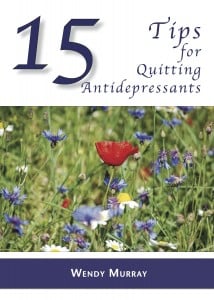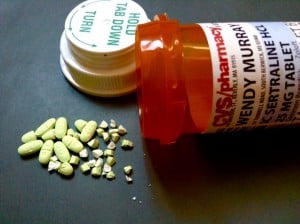 Since May is Mental Health Awareness month, I am highlighting my experience with taking antidepressants and how, over time, I concluded they were causing me more harm than they were doing me good and thus decided to get off of them.
Since May is Mental Health Awareness month, I am highlighting my experience with taking antidepressants and how, over time, I concluded they were causing me more harm than they were doing me good and thus decided to get off of them.
I had been put on antidepressants by my G.P. during a rough patch (as is the case for so many for whom these drugs are casually prescribed). I found, over time, that my mind was growing dull, my thinking fogged, and I sometimes found it hard to come up with the right word. Coming up with the right word had never been a problem for me and this was alarming. One instant I possessed a lucid thought and in the next instant it was gone. What was I saying? What was I about to do? I looked up the symptoms for early-onset Alzheimers and was consoled to discover that, foggy though I had become, I did not have moments of forgetting where I was or keeping track of the date. Those faculties were still intact.
I had read a line from the great writer G.K. Chesterton which caused me to pause: “The poet only desires exaltation and expansion, a world to stretch himself in.” Reading this, it struck me that this is what I had lost. Somewhere along the way this sense expansion had shriveled and the spark of imagination had gone out. The more I pondered this, the more I became increasingly convinced that the brain medication had affected a deteriorating mental lethargy. I began to look into it, and, as light breaks through a cloud, came to see that it is quite common in SSRI patients that the spark of imagination disappears and the “desire for expansion” evaporates when taking these medications. The dullness afflicted me and “the poetic expansion” of the intangible self that Chesterton referred to had deflated. I could cobble together little bits of fleeting insights about some issue now and then but felt incapable of capturing a grand theme or sustaining a meaningful narrative about anything. I am a writer and my vocation requires that I write. Taking SSRIs had overthrown all that was poetic in me. On SSRIs my brain desired nothing; it didn’t exalt and it didn’t expand. I felt deflated, washing about in an aimless sea, and writing is hard enough without your creative faculties being chemically sabotaged.
I wanted words back. My only prayer was that I would regain clarity of mind. This propelled me to conclude that the medication was working against me now and it was time to stop.
This was the point at which I took it upon myself to begin tapering by cutting my tablets in half at an accelerated rate. This was the 40mg-to-20mg-to-10mg-to-5mg-to- 2.5mg-over-six-weeks regimen that ultimately led to that moment coming down the stairs when I decided to take my destiny into my own hands and end it.
Then, as if being hit by a train, I woke up feeling catastrophically hopeless. I felt trapped inside a cage with its walls closing in on me — moving walls, with spike-like-teeth — moving inch by inch closing in on me. I saw no escape. I saw only a “poof” — a disappearance, the only deliverance from these contracting walls. This is the only way to describe what I felt.
This episode lasted for a few days and it shocked me.

Beloved and (at the time) bewildered friends pulled me through that crisis. The spiked walls retracted. It hadn’t occurred to me at this point that this intractable despair was the manifestation of withdrawal symptoms — that is, my brain’s trying to adjust to the new conditions in its neurological apparatus because of the taper. I assumed it had been the state of my depression which, prior to tapering, had been held in check by the medication. Looking back, I know now that it was not the state of my depression. It was the effect of the meds themselves that had brought on these catastrophic symptoms.
But when you “battle depression,” you accept a depressive nature as your lot. It does not occur to you that the medication itself could be fueling, even worsening, my symptoms as I continued to confront my “ongoing battle with depression.”
To be continued . . .










